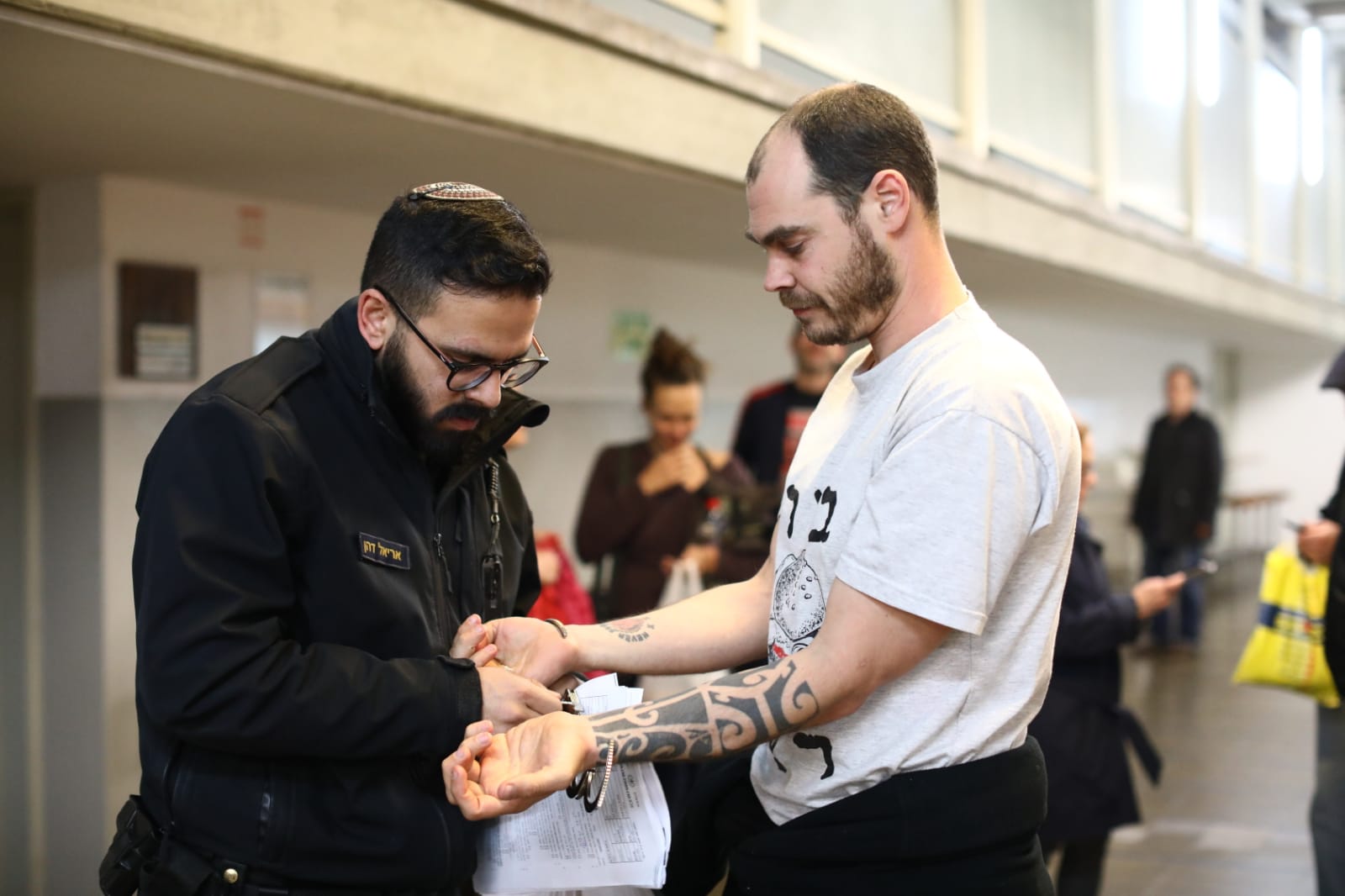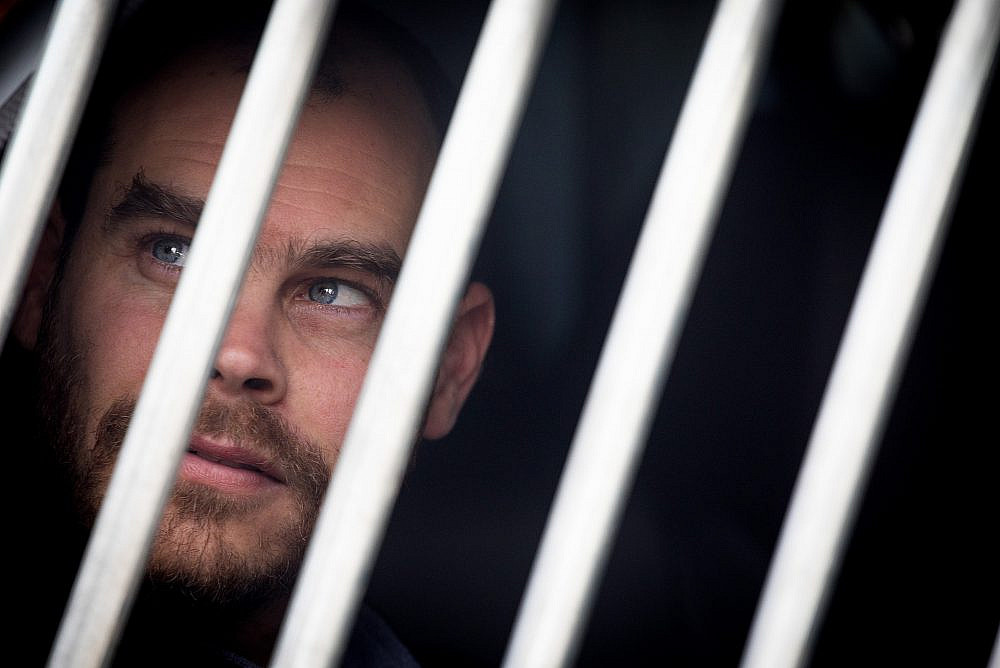The Jerusalem Magistrate’s Court ruled on Tuesday that Jonathan Pollak, an Israeli anti-occupation activist who was arrested this week after refusing to appear in court over a private prosecution filed against him by an extreme-right group, will remain in jail.
Pollak was arrested Monday at the Haaretz building in south Tel Aviv where he works. He has repeatedly refused to participate in the proceedings against him, saying he does not recognize the legitimacy of a system that maintains a “military dictatorship” over “subjects that lack all basic democratic rights” in the West Bank and Gaza or are “second-class citizens” in Israel.
Pollak also refused to pay the NIS 500 bail set by a Tel Aviv judge on Monday. The judges and police officers involved in his arrest have seemed unsure as to how to handle his case, urging him to sign his bail and be released.
Pollak is one of three Israelis being sued by Ad Kan, an extreme-right group that has previously infiltrated and secretly taped Israeli human rights organizations. The private prosecution attempt, the first of its kind, focuses on the trio’s participation in protests against the West Bank separation wall and accuses the defendants of “attacking IDF soldiers and Border Police officers.”
Attorney Gaby Lasky, who is representing the three defendants, called on the court to throw out what she characterized as an unprecedented criminal complaint.
Private prosecution attempts such as these, in which an individual citizen can file a criminal lawsuit via the state, are extremely rare and involve a limited range of transgressions: defamation, protection of privacy, or neighborly disputes.
While Ad Kan’s complaint against Pollak and his co-defendants alleges that they attacked Israeli security forces, it does not provide any evidence to show that they were personally involved in such an assault. Rather, it simply states that they were present at a demonstration in which others — young Palestinians, it notes — threw stones at soldiers.

Regardless of intent, this type of crime is categorized either as aggravated assault or assault on a public servant, neither of which fall under the remit of private prosecutions such as the one brought by Ad Kan. This especially holds true for the second category: only the state can press charges for an assault on one of its employees. On this front, the Ad Kan suit should have been thrown out on a technicality at its first hearing last year.
Moreover, private prosecutions also need to establish that there is a damaged party and a party that has inflicted the damage. Ad Kan has not provided this evidence, nor has it established even a tenuous link between the defendants’ presence at the demonstration and the injuries to the soldiers. At a hearing last December, Judge Dov Pollock noted the lack of evidence on which the accusations were based.
“Where are the facts? Were these people just standing on the sidelines?” he asked Ad Kan’s lawyer. “An indictment needs details on who was injured and how, and you’ve provided nothing. I want to see evidence that proves the facts, but which facts are you trying to prove?”
Ad Kan submitted an updated indictment at the same hearing, which was also devoid of serious claims. It simply noted the dates on which the defendants had attended West Bank demonstrations over the years — facts that the three of them, all of whom are open about their political activity, have made no effort to hide.
Technical issues aside, Ad Kan’s suit is disturbing for the ways in which the state and the courts have enabled a far-right organization to take legal action against left-wing activists in order to deter them — and others — from protesting the occupation.
On Monday, shortly after Pollak’s arrest, Ad Kan sent out a press release with photographs of the incident and which confirmed that he had been arrested by undercover police officers at the offices of Haaretz. Notably, Pollak was assaulted by two men in July 2019 as he left the office, who attacked him with a knife and called him a “leftist asshole.”
Why were representatives of Ad Kan present at the arrest? Did they coordinate with the police? Ad Kan’s own Facebook page suggests that they did, claiming that the officers had “reached Pollak under our directions.”
In addition to assisting with the arrest, Ad Kan also sent its attorney, Tzur Falk, to the Jerusalem Magistrate’s Court on Tuesday, where he requested to present an argument. Although the judge explained that it was a detention hearing in which Ad Kan had no grounds to participate, Falk nonetheless insisted that the organization wanted to set Pollak’s conditions of release — which can only be set by the judge.
After being unable to make its case in court, the organization submitted a written request for Pollak to be barred from the West Bank, which the court rejected on Wednesday.
Ad Kan’s Facebook page offers a clue as to the conditions of release the organization is after. They are seeking a restraining order that would keep Pollak out of the West Bank, thus preventing him from attending demonstrations. This is an acknowledgement of the real motivation for this lawsuit: trying to prevent Israelis from going to the occupied territories and standing in solidarity with Palestinian demonstrators.
Hand-in-glove with the legal system
In practice, Ad Kan’s modus operandi works something like this: the organization dispatches its people to tail individual citizens, sues them in private suits, demands their arrest, assists police officers in carrying out that arrest, and then tries to set conditions of release on the court’s behalf.
Each of these steps by Ad Kan will have required coordination with the courts, the police and the attorney general, who has yet to respond to Lasky’s request — made six months ago — that he put a stop to the process. Former Attorney General Michael Ben Yair even called the prosecution of Pollak an “outrage” and “an utter abuse of criminal processes.”
Even if the case against Pollak is shortly thrown out, it nevertheless signals a new level of right-wing persecution of anti-occupation activists. Should Ad Kan’s private prosecution be brought to a halt, Pollak will be released without having to plead bail or make a further court appearance. Until then, he appears unlikely to back down from his refusal to recognize the court’s authority, and is expected to spend an extended period of time behind bars.
This article was originally published in Hebrew on Local Call. Read it here.



